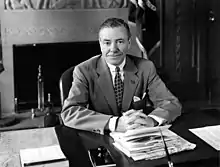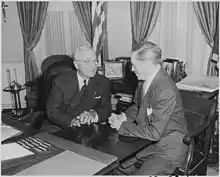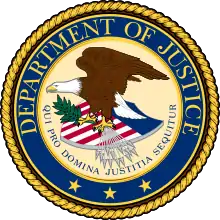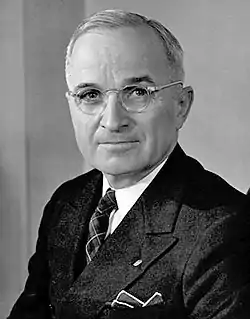James P. McGranery
James Patrick McGranery (July 8, 1895 – December 23, 1962) was a United States Representative from Pennsylvania, a United States District Judge of the United States District Court for the Eastern District of Pennsylvania and Attorney General of the United States.
James P. McGranery | |
|---|---|
 | |
| 61st United States Attorney General | |
| In office April 4, 1952 – January 20, 1953 | |
| President | Harry S. Truman |
| Preceded by | J. Howard McGrath |
| Succeeded by | Herbert Brownell Jr. |
| Judge of the United States District Court for the Eastern District of Pennsylvania | |
| In office August 7, 1946 – May 26, 1952 | |
| Appointed by | Harry S. Truman |
| Preceded by | Harry Ellis Kalodner |
| Succeeded by | John W. Lord Jr. |
| Member of the U.S. House of Representatives from Pennsylvania's 2nd district | |
| In office January 3, 1937 – November 17, 1943 | |
| Preceded by | William H. Wilson |
| Succeeded by | Joseph Marmaduke Pratt |
| Personal details | |
| Born | James Patrick McGranery July 8, 1895 Philadelphia, Pennsylvania |
| Died | December 23, 1962 (aged 67) Palm Beach, Florida |
| Resting place | Arlington National Cemetery Fort Myer, Virginia |
| Political party | Democratic |
| Education | Temple University Beasley School of Law (LL.B.) |
Education and career
Born in Philadelphia, Pennsylvania,[1][2] the son of Patrick McGranery, and Bridget (née Gallagher), both Irish immigrants,[3] McGranery attended the parochial schools and Maher Preparatory School. He was in the United States Army Air Corps as an observation pilot and as an adjutant in the 111th Infantry Regiment from 1917 to 1919. He received a Bachelor of Laws from Temple University Beasley School of Law in 1928 and was admitted to the Pennsylvania bar the same year. He entered the private practice of law in Philadelphia from 1928 to 1937. He was a member of the Democratic State Committee from 1928 to 1932. He was an unsuccessful candidate for District Attorney of Philadelphia County in 1931 and for election to the 74th United States Congress in 1934. He served as Chairman of the Registration Commission of the City of Philadelphia in 1935. He was a United States Representative from Pennsylvania from 1937 to 1943. He was admitted to practice before the Supreme Court of the United States in 1939. He was an assistant to the United States Attorney General in the United States Department of Justice in Washington, D.C. from 1943 to 1946.[1][2]
Congressional service
McGranery was elected as a Democrat to the 75th United States Congress and to the three succeeding Congresses and served from January 3, 1937, until his resignation on November 17, 1943, to become an assistant to the United States Attorney General.[1]
Federal judicial service
McGranery was nominated by President Harry S. Truman on July 31, 1946, to a seat on the United States District Court for the Eastern District of Pennsylvania vacated by Judge Harry Ellis Kalodner. He was confirmed by the United States Senate on July 31, 1946, and received his commission on August 7, 1946. He took the oath of office on October 9, 1946. His service was terminated on May 26, 1952, due to his resignation.[2]
Post judicial service

McGranery was the Attorney General of the United States from May 27, 1952 to January 20, 1953.[1][2] McGranery revoked the re-entry permit of Charlie Chaplin, when he was accused of Communist sympathies.[4] He returned to the private practice of law in Washington, D.C., from 1954 until his death.[1][2]
Death
McGranery died on December 23, 1962, in Palm Beach, Florida.[1][2] He was interred in Arlington National Cemetery in Fort Myer, Virginia.[1]
References
- United States Congress. "James P. McGranery (id: M000454)". Biographical Directory of the United States Congress.
- "McGranery, James Patrick – Federal Judicial Center". www.fjc.gov.
- "United States Census, 1900", FamilySearch, retrieved March 25, 2018
- Woo, Elaine (2011-09-29). "Mo Rothman dies at 92; found new audience for Chaplin". Los Angeles Times. Retrieved 2011-10-01.
External links
 Media related to James P. McGranery at Wikimedia Commons
Media related to James P. McGranery at Wikimedia Commons
- United States Congress. "James P. McGranery (id: M000454)". Biographical Directory of the United States Congress. Retrieved on 2008-02-10
- Profile at Truman Library
- Arlington National Cemetery
| U.S. House of Representatives | ||
|---|---|---|
| Preceded by William H. Wilson |
Member of the U.S. House of Representatives from Pennsylvania's 2nd congressional district 1937–1943 |
Succeeded by Joseph Marmaduke Pratt |
| Legal offices | ||
| Preceded by Harry Ellis Kalodner |
Judge of the United States District Court for the Eastern District of Pennsylvania 1946–1952 |
Succeeded by John W. Lord Jr. |
| Preceded by J. Howard McGrath |
U.S. Attorney General Served under: Harry S. Truman 1952–1953 |
Succeeded by Herbert Brownell Jr. |

